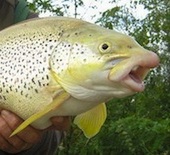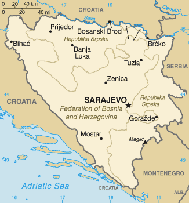Searching for the Softmouth

I had heard about a trout with a funny name, softmouth. Fascinating. And it is no less so once you see a picture of it. It looks like a clown. The softmouth trout is endemic to the Balkans. And not only the softmouth, once I started to look into it, I found that the Balkans has a fascinating diversity of trout that is not found in any other place in Europe. For a biologist, the unique diversity of Balkan trout species is exciting: it includes issues such as adaptive radiation, speciation, evolution of life histories, and so on – the whole repertoire of evolutionary biology. But despite the fascinating and clown-looking softmouth trout, this diversity has just started to be documented and understood by biologist during the last decade.
The effort to study the trout of the Balkans did not start one day too early. The endemic trout of the Balkans are all threatened by the destruction of habitat, dams that inundate rivers and prevent migration, hybridization with stocked brown trout, and competition with introduced rainbow trout imported from the US. Add to this the destruction that came as a consequence of a ravaging civil war.
But before the civil war, before Tito, and before the world wars, the Balkans was known for its great fly fishing among European anglers. In 1997, the American painter, writer, and angler James Prosek traveled to the the Neretva River for the first time to follow the footsteps of earlier anglers. Being impressed by the river and the trout, he later helped to secure funding for studies of the fish by a group that would be known as the Balkan Trout Restoration Group. Today, this group continues to study the genetics, taxonomy, and biology of the native Adriatic trout and works to conserve these true native forms from extirpation.
As I desperately wanted to see the softmouth trout, I contacted some of the members of the Balkan Trout Restoration Group to see if they had any advice on the possibility to arrange a tour to the area. To my excitement they responded. Not only did they respond, but after telling them that I wanted to see the trout, they invited me to participate in one of their field sampling trips. This was pure music to me; I was extremely excited about the opportunity to see the softmouth trout. However, there was one thing that bothered me. I did not know much about Bosnia-Herzegovina and the people other than what I knew from the news about the war. In essence, I did not know what the human connection to the fish would be.
I arrived in Dubrovnik, Croatia, on the evening of August 24. The next day I opened up the curtains of my hotel window to find the view of a beautiful bay with houses climbing up the hills. The sea was clear and people were spread out on the beach sunbathing as a seals on a rock. The following day I was going to meet with Professor Branko Glamuzina from the University of Dubrovnik to plan my activities there.
Unfortunately and to my disappointment, the fieldwork that I was supposed to participate in had been postponed. I already had tickets for Mongolia and pushing back that trip was out of the question. So, instead it was planned for me to visit a research hatchery in Konjic in the Nereteva River watershed of Bosnia and Herzegovina where they breed local endemic trout. I also hoped to visit a commercial hatchery and fish farm not far from the historic city of Mostar in an area that was torn apart during the war. The farm is run by a Norwegian company by the name of Norfish with significant Norwegian investment. It has as aim at building up a viable fish farm industry in the area. As the company writes, they want to rebuild the business life in one of the most war torn areas of Bosnia-Herzegovina.
Both Muslims and Christians work together at the plant and there is a distinct feeling of community in the company.
Exactly what the plans were, I did not know yet. I hoped to film the river and the beautiful landscape of the area; to interview staff and managers at the hatcheries; and to meet local people that have been fishing for the local trout. I hoped to find a story about fish and men.
